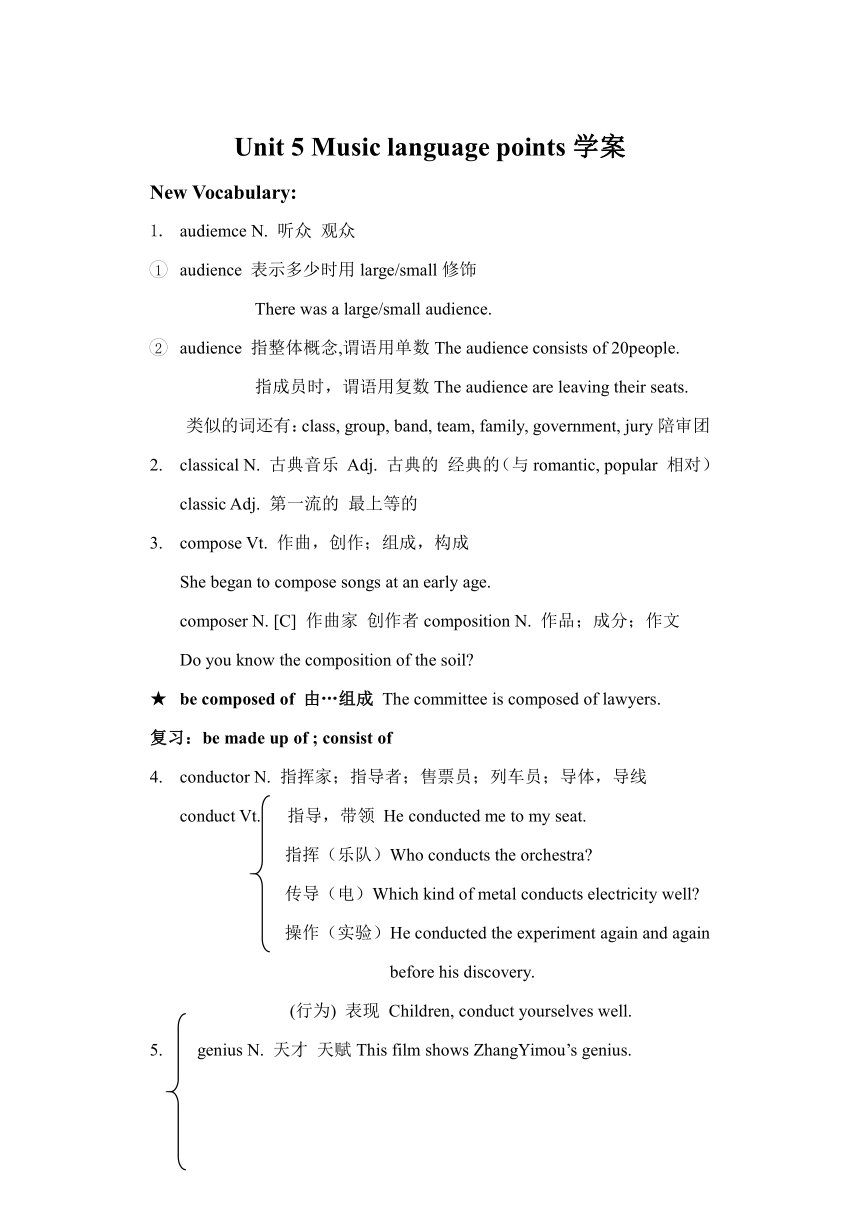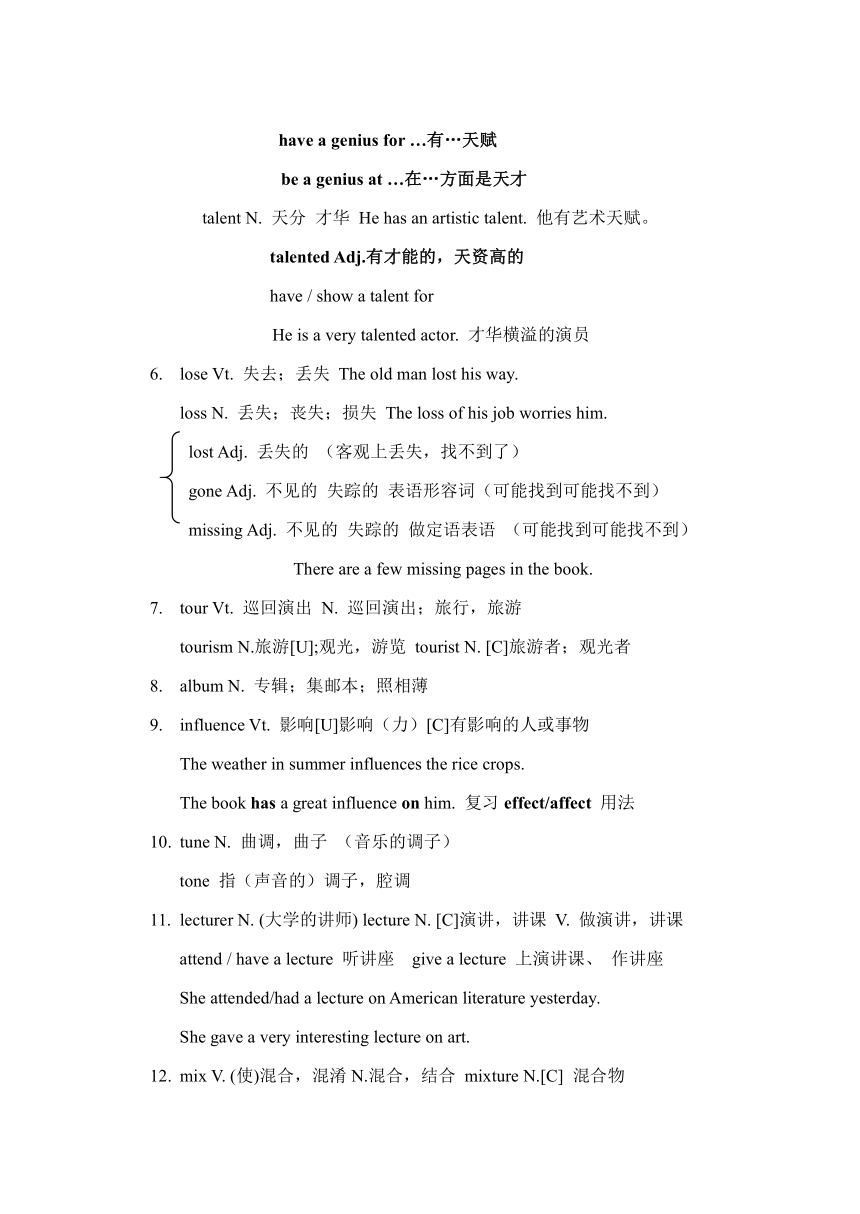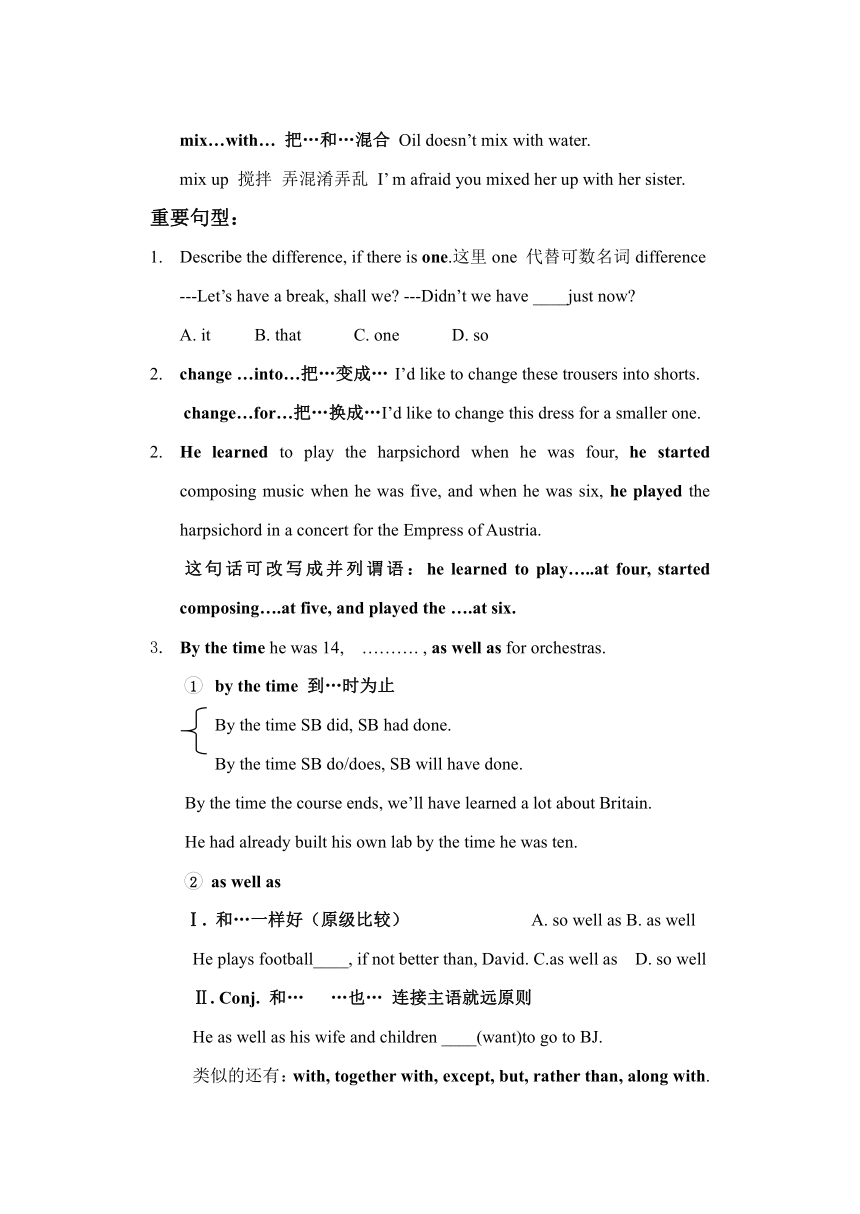人教版必修二Unit 5 Music language points学案
文档属性
| 名称 | 人教版必修二Unit 5 Music language points学案 |  | |
| 格式 | docx | ||
| 文件大小 | 24.9KB | ||
| 资源类型 | 教案 | ||
| 版本资源 | 人教版(新课程标准) | ||
| 科目 | 英语 | ||
| 更新时间 | 2020-12-18 10:24:15 | ||
图片预览



文档简介
Unit 5 Music language points学案
New Vocabulary:
audiemce N. 听众 观众
audience 表示多少时用large/small修饰
There was a large/small audience.
audience 指整体概念,谓语用单数The audience consists of 20people.
指成员时,谓语用复数The audience are leaving their seats.
类似的词还有:class, group, band, team, family, government, jury陪审团
classical N. 古典音乐 Adj. 古典的 经典的(与romantic, popular 相对)
classic Adj. 第一流的 最上等的
compose Vt. 作曲,创作;组成,构成
She began to compose songs at an early age.
composer N. [C] 作曲家 创作者composition N. 作品;成分;作文
Do you know the composition of the soil?
be composed of 由…组成 The committee is composed of lawyers.
复习:be made up of ; consist of
conductor N. 指挥家;指导者;售票员;列车员;导体,导线
conduct Vt. 指导,带领 He conducted me to my seat.
指挥(乐队)Who conducts the orchestra?
传导(电)Which kind of metal conducts electricity well?
操作(实验)He conducted the experiment again and again before his discovery.
(行为) 表现 Children, conduct yourselves well.
genius N. 天才 天赋This film shows ZhangYimou’s genius.
have a genius for …有…天赋
be a genius at …在…方面是天才
talent N. 天分 才华 He has an artistic talent. 他有艺术天赋。
talented Adj.有才能的,天资高的
have / show a talent for
He is a very talented actor. 才华横溢的演员
lose Vt. 失去;丢失 The old man lost his way.
loss N. 丢失;丧失;损失 The loss of his job worries him.
lost Adj. 丢失的 (客观上丢失,找不到了)
gone Adj. 不见的 失踪的 表语形容词(可能找到可能找不到)
missing Adj. 不见的 失踪的 做定语表语 (可能找到可能找不到)
There are a few missing pages in the book.
tour Vt. 巡回演出 N. 巡回演出;旅行,旅游
tourism N.旅游[U];观光,游览 tourist N. [C]旅游者;观光者
album N. 专辑;集邮本;照相薄
influence Vt. 影响[U]影响(力)[C]有影响的人或事物
The weather in summer influences the rice crops.
The book has a great influence on him. 复习effect/affect 用法
tune N. 曲调,曲子 (音乐的调子)
tone 指(声音的)调子,腔调
lecturer N. (大学的讲师) lecture N. [C]演讲,讲课 V. 做演讲,讲课
attend / have a lecture 听讲座 give a lecture 上演讲课、 作讲座
She attended/had a lecture on American literature yesterday.
She gave a very interesting lecture on art.
mix V. (使)混合,混淆N.混合,结合 mixture N.[C] 混合物
mix…with… 把…和…混合 Oil doesn’t mix with water.
mix up 搅拌 弄混淆弄乱 I’ m afraid you mixed her up with her sister.
重要句型:
Describe the difference, if there is one.这里one 代替可数名词difference
---Let’s have a break, shall we? ---Didn’t we have ____just now?
A. it B. that C. one D. so
2. change …into…把…变成… I’d like to change these trousers into shorts.
change…for…把…换成…I’d like to change this dress for a smaller one.
He learned to play the harpsichord when he was four, he started composing music when he was five, and when he was six, he played the harpsichord in a concert for the Empress of Austria.
这句话可改写成并列谓语:he learned to play…..at four, started composing….at five, and played the ….at six.
By the time he was 14, ………. , as well as for orchestras.
by the time 到…时为止
By the time SB did, SB had done.
By the time SB do/does, SB will have done.
By the time the course ends, we’ll have learned a lot about Britain.
He had already built his own lab by the time he was ten.
as well as
Ⅰ. 和…一样好(原级比较) A. so well as B. as well
He plays football____, if not better than, David. C.as well as D. so well
Ⅱ. Conj. 和… …也… 连接主语就远原则
He as well as his wife and children ____(want)to go to BJ.
类似的还有:with, together with, except, but, rather than, along with.
Dr. Smith, together with his wife, is to arrive on the evening flight.
就近原则的有:not only…but also…; either…or…;
neither…nor…; not…but…
4. Mozart met Beethoven and was impressed by him.
impress sth on/upon sb 使某人铭记某事
sb with sth
Sb be impressed by/with/at sth 对…留下深刻印象
one’s first impression of sb 某人对某人的第一印象
leave a ….impression on sb
It was Haydn who encouraged Beethoven to move Vienna.
强调句结构:It is/was + 被强调部分+ that/who + 句子其余部分
It is they who/that arrange everything.正是由他们安排的一切。
It was because I was stuck in the traffic that I came late.
I can’t stand….我受不了….
一般与can/could连用,主要用于否定和疑问句中。
She can’t stand being looked down upon.
He can’t stand others’ interrupting while he was speaking.
split up 分裂 分开 分手 破裂 = break up
What will happen to the children if Jim and Mary break up?
复习 make up
Phrases:
1. different from 与…不同 2. change…into/for…把…变成/换成
3. be born in sp 出生在… 4. of all time 有史以来
5. the rest of his life 他的晚年 6.play the violin/piano 拉小提琴/钢琴
7. go deaf 变聋 8. hear of 听说
9.if so 要是这样的话 10. no way! 没门!
11.likes and dislikes好恶 12.split up 分裂,分手
13.record albums 录制专辑 14.work…as… 做为…工作着
15.make/take notes 记笔记 16.tour Europe 巡回欧洲
17.some similarities between A and B A和B之间的相似点
18. show musical talent 表现出音乐天分
19. be/become popular with sb in sp 在某地受某人欢迎
Grammar:
时间状语从句(when, while, as)
在句子中起时间状语作用的句子叫做时间状语从句。时间状语从句可以放在句首、句中或句尾。
⑴ when “当…时”,引导时间状语从句,表示主句的动作和从句的动作同
时或先后发生。从句中的动词可以用延续性动词,也可以用瞬间动词。
When you are crossing the street, you must be careful.
I was watching TV when someone knocked at the door.
I worked for a foreign company when I was in ShangHai.
⑵ while “与…同时,在…期间”,从句中的动词常用延续性动词或表示状
态的动词。They rushed in while we were discussing.
Father was cleaning the car while I was playing computer games.
⑶ as 引导的时间状语从句,可以表示某事一发生,另一事立即发生;也
可表示在某事发生的过程中另一事发生;还可表示两个动作同时发生。
As the sun rose the fog disappeared.
Just as he was speaking there was a loud explosion.
正当他在说话的时候,出现了一声巨响。
As she sang, tears ran down her cheeks.
We get wiser as we get older.我们随着年龄的增长而变得聪明起来。
⑷ 引导时间状语从句的连词或短语还有before, after, until, as soon as,
since, each time, next time, the moment, immediately等等。
过去完成时
⑴ 定语:发生在过去的过去
⑵ 构成:had done
⑶ 否定:had not done = hadn’t done
⑷ 用法:
hope, wish, plan, want, mean, intend, attempt, think, expect等表示“打算,计划,希望,试图,认为”等的动词用于过去完成时时表示“本打算,本认为,本希望做而未做”。
He had intended to speak, but time didn’t permit.
I had hoped to be back last night, but I didn’t catch the train.
The boy had meant to come in but the teacher refused him.
用于“hardly/scarcely…when…和 no sooner…than…”句式中,主句常用过去完成时表示“还没来得及…就…”。当否定副词hardly, scarcely, no sooner 等置于句首时,主句部分倒装。
I had hardly answered the teacher when he interrupted me.
= Hardly had I answered the teacher when he interrupted me.
我还没来得及回答老师的问题,他就打断了我的话。
We had no sooner arrived than we started singing and dancing.
= No sooner had we arrived than we started singing and dancing.
我们一到就开始唱歌跳舞。
New Vocabulary:
audiemce N. 听众 观众
audience 表示多少时用large/small修饰
There was a large/small audience.
audience 指整体概念,谓语用单数The audience consists of 20people.
指成员时,谓语用复数The audience are leaving their seats.
类似的词还有:class, group, band, team, family, government, jury陪审团
classical N. 古典音乐 Adj. 古典的 经典的(与romantic, popular 相对)
classic Adj. 第一流的 最上等的
compose Vt. 作曲,创作;组成,构成
She began to compose songs at an early age.
composer N. [C] 作曲家 创作者composition N. 作品;成分;作文
Do you know the composition of the soil?
be composed of 由…组成 The committee is composed of lawyers.
复习:be made up of ; consist of
conductor N. 指挥家;指导者;售票员;列车员;导体,导线
conduct Vt. 指导,带领 He conducted me to my seat.
指挥(乐队)Who conducts the orchestra?
传导(电)Which kind of metal conducts electricity well?
操作(实验)He conducted the experiment again and again before his discovery.
(行为) 表现 Children, conduct yourselves well.
genius N. 天才 天赋This film shows ZhangYimou’s genius.
have a genius for …有…天赋
be a genius at …在…方面是天才
talent N. 天分 才华 He has an artistic talent. 他有艺术天赋。
talented Adj.有才能的,天资高的
have / show a talent for
He is a very talented actor. 才华横溢的演员
lose Vt. 失去;丢失 The old man lost his way.
loss N. 丢失;丧失;损失 The loss of his job worries him.
lost Adj. 丢失的 (客观上丢失,找不到了)
gone Adj. 不见的 失踪的 表语形容词(可能找到可能找不到)
missing Adj. 不见的 失踪的 做定语表语 (可能找到可能找不到)
There are a few missing pages in the book.
tour Vt. 巡回演出 N. 巡回演出;旅行,旅游
tourism N.旅游[U];观光,游览 tourist N. [C]旅游者;观光者
album N. 专辑;集邮本;照相薄
influence Vt. 影响[U]影响(力)[C]有影响的人或事物
The weather in summer influences the rice crops.
The book has a great influence on him. 复习effect/affect 用法
tune N. 曲调,曲子 (音乐的调子)
tone 指(声音的)调子,腔调
lecturer N. (大学的讲师) lecture N. [C]演讲,讲课 V. 做演讲,讲课
attend / have a lecture 听讲座 give a lecture 上演讲课、 作讲座
She attended/had a lecture on American literature yesterday.
She gave a very interesting lecture on art.
mix V. (使)混合,混淆N.混合,结合 mixture N.[C] 混合物
mix…with… 把…和…混合 Oil doesn’t mix with water.
mix up 搅拌 弄混淆弄乱 I’ m afraid you mixed her up with her sister.
重要句型:
Describe the difference, if there is one.这里one 代替可数名词difference
---Let’s have a break, shall we? ---Didn’t we have ____just now?
A. it B. that C. one D. so
2. change …into…把…变成… I’d like to change these trousers into shorts.
change…for…把…换成…I’d like to change this dress for a smaller one.
He learned to play the harpsichord when he was four, he started composing music when he was five, and when he was six, he played the harpsichord in a concert for the Empress of Austria.
这句话可改写成并列谓语:he learned to play…..at four, started composing….at five, and played the ….at six.
By the time he was 14, ………. , as well as for orchestras.
by the time 到…时为止
By the time SB did, SB had done.
By the time SB do/does, SB will have done.
By the time the course ends, we’ll have learned a lot about Britain.
He had already built his own lab by the time he was ten.
as well as
Ⅰ. 和…一样好(原级比较) A. so well as B. as well
He plays football____, if not better than, David. C.as well as D. so well
Ⅱ. Conj. 和… …也… 连接主语就远原则
He as well as his wife and children ____(want)to go to BJ.
类似的还有:with, together with, except, but, rather than, along with.
Dr. Smith, together with his wife, is to arrive on the evening flight.
就近原则的有:not only…but also…; either…or…;
neither…nor…; not…but…
4. Mozart met Beethoven and was impressed by him.
impress sth on/upon sb 使某人铭记某事
sb with sth
Sb be impressed by/with/at sth 对…留下深刻印象
one’s first impression of sb 某人对某人的第一印象
leave a ….impression on sb
It was Haydn who encouraged Beethoven to move Vienna.
强调句结构:It is/was + 被强调部分+ that/who + 句子其余部分
It is they who/that arrange everything.正是由他们安排的一切。
It was because I was stuck in the traffic that I came late.
I can’t stand….我受不了….
一般与can/could连用,主要用于否定和疑问句中。
She can’t stand being looked down upon.
He can’t stand others’ interrupting while he was speaking.
split up 分裂 分开 分手 破裂 = break up
What will happen to the children if Jim and Mary break up?
复习 make up
Phrases:
1. different from 与…不同 2. change…into/for…把…变成/换成
3. be born in sp 出生在… 4. of all time 有史以来
5. the rest of his life 他的晚年 6.play the violin/piano 拉小提琴/钢琴
7. go deaf 变聋 8. hear of 听说
9.if so 要是这样的话 10. no way! 没门!
11.likes and dislikes好恶 12.split up 分裂,分手
13.record albums 录制专辑 14.work…as… 做为…工作着
15.make/take notes 记笔记 16.tour Europe 巡回欧洲
17.some similarities between A and B A和B之间的相似点
18. show musical talent 表现出音乐天分
19. be/become popular with sb in sp 在某地受某人欢迎
Grammar:
时间状语从句(when, while, as)
在句子中起时间状语作用的句子叫做时间状语从句。时间状语从句可以放在句首、句中或句尾。
⑴ when “当…时”,引导时间状语从句,表示主句的动作和从句的动作同
时或先后发生。从句中的动词可以用延续性动词,也可以用瞬间动词。
When you are crossing the street, you must be careful.
I was watching TV when someone knocked at the door.
I worked for a foreign company when I was in ShangHai.
⑵ while “与…同时,在…期间”,从句中的动词常用延续性动词或表示状
态的动词。They rushed in while we were discussing.
Father was cleaning the car while I was playing computer games.
⑶ as 引导的时间状语从句,可以表示某事一发生,另一事立即发生;也
可表示在某事发生的过程中另一事发生;还可表示两个动作同时发生。
As the sun rose the fog disappeared.
Just as he was speaking there was a loud explosion.
正当他在说话的时候,出现了一声巨响。
As she sang, tears ran down her cheeks.
We get wiser as we get older.我们随着年龄的增长而变得聪明起来。
⑷ 引导时间状语从句的连词或短语还有before, after, until, as soon as,
since, each time, next time, the moment, immediately等等。
过去完成时
⑴ 定语:发生在过去的过去
⑵ 构成:had done
⑶ 否定:had not done = hadn’t done
⑷ 用法:
hope, wish, plan, want, mean, intend, attempt, think, expect等表示“打算,计划,希望,试图,认为”等的动词用于过去完成时时表示“本打算,本认为,本希望做而未做”。
He had intended to speak, but time didn’t permit.
I had hoped to be back last night, but I didn’t catch the train.
The boy had meant to come in but the teacher refused him.
用于“hardly/scarcely…when…和 no sooner…than…”句式中,主句常用过去完成时表示“还没来得及…就…”。当否定副词hardly, scarcely, no sooner 等置于句首时,主句部分倒装。
I had hardly answered the teacher when he interrupted me.
= Hardly had I answered the teacher when he interrupted me.
我还没来得及回答老师的问题,他就打断了我的话。
We had no sooner arrived than we started singing and dancing.
= No sooner had we arrived than we started singing and dancing.
我们一到就开始唱歌跳舞。
